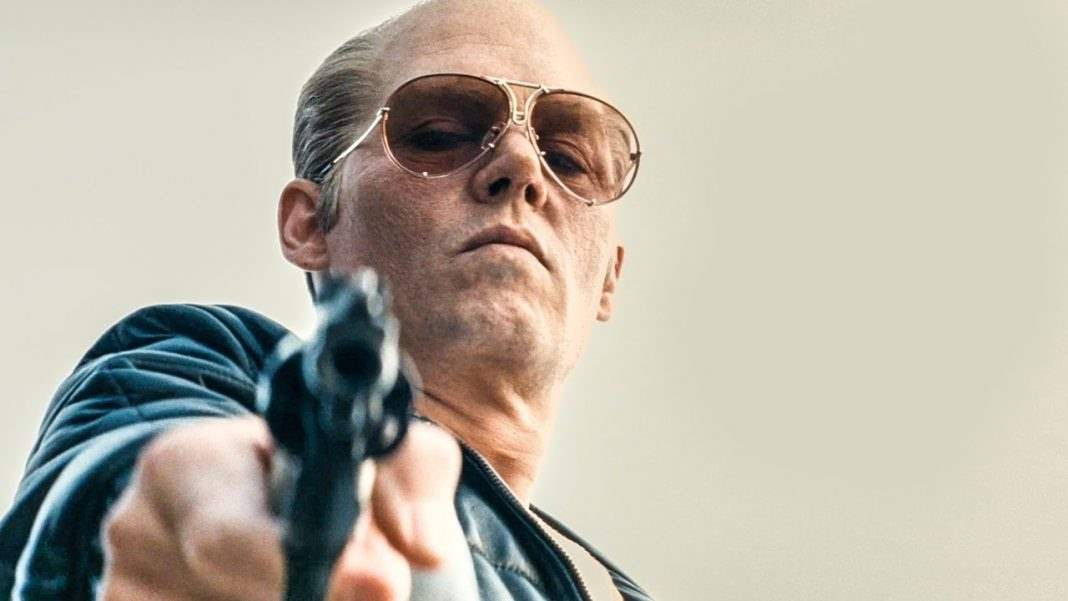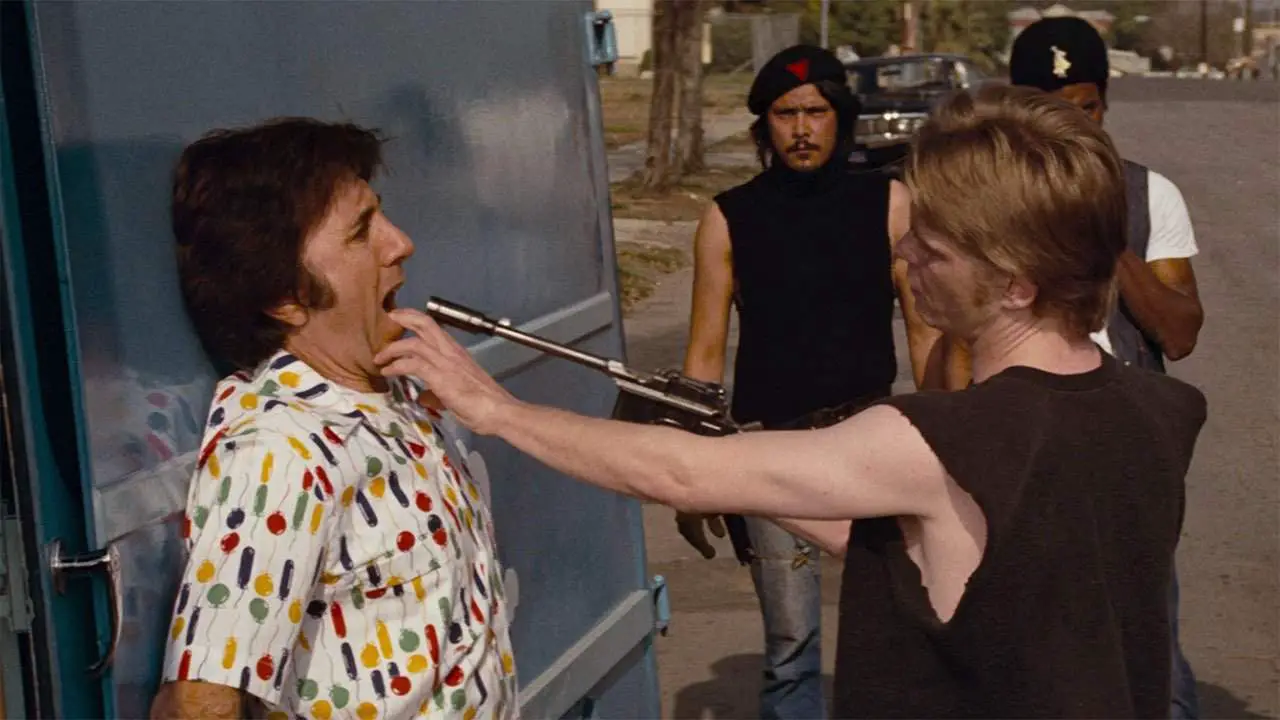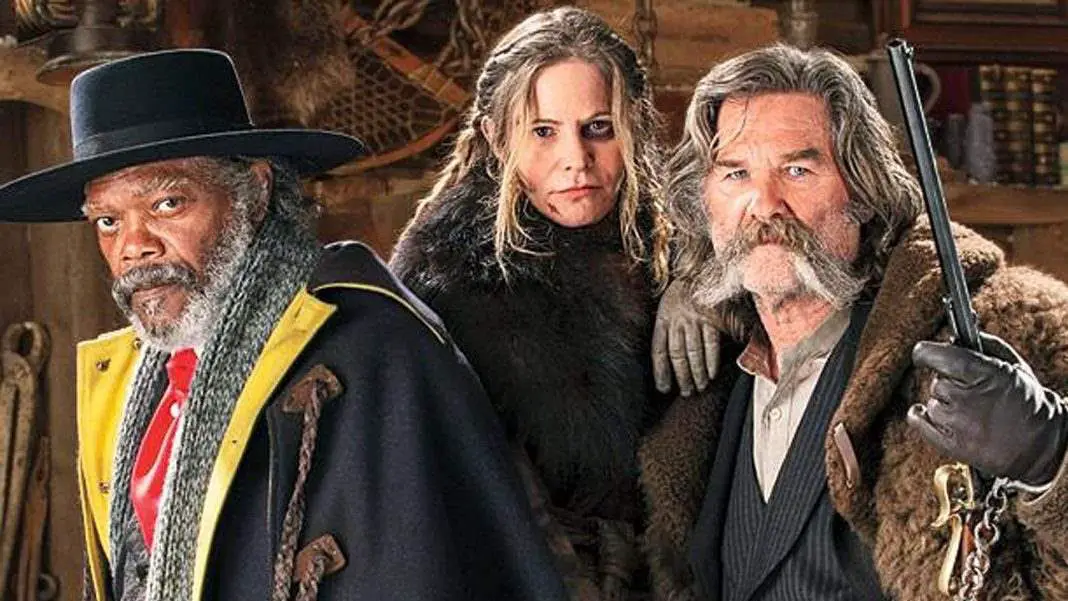Horror is evolving as a genre. Although your local multiplex is still peppered with the usual contenders, look a bit closer and you’ll find the latest drama, thriller, or crime offering is closer to horror than you might expect. In this bi-weekly series, Joey Keogh presents a film not generally classified as horror and argues why it exhibits the qualities of a great flight flick, and therefore deserves the attention of fans as an example of Not Quite Horror. This week, we take a look at Johnny Depp’s critically-acclaimed return to form as James “Whitey” Bulger Black Mass.
Nothing nice happens in Black Mass. We know this right from its opening moments, when the blood-curdlingly effective score, by Norwegian composer Junkie XL, kicks in and a mood is established. It’s the kind of mood that gives you goosebumps for no good reason, the kind that makes the hair on the back of your neck stand up, that causes you to pull your jacket a bit closer to your neck as though a gust of wind might suddenly blow through you, chilling you to the bone.
This is a cold, brutal film which, in spite of its Hollywood sheen, has very few moments of respite–and those that do exist are fleeting. We’re introduced to James “Whitey” Bulger by way of a tense, pub-set discussion with a colleague, charged with anger, during which it’s established that you don’t mess with this guy. Nothing is really said or done to provoke alarm, but it’s the intensity of the words exchanged, along with how the scene is lit (read: barely) and the hum of that score that alerts us to the fact something is very wrong here.
Last week, I argued that Johnny Depp didn’t really stand a chance of embodying Bulger, no matter how much make-up or coloured contact lenses were involved, because the real life crime lord had already been portrayed, unofficially, by Jack Nicholson in The Departed. Although Depp can’t really hold a candle to Nicholson’s performance, his take on Bulger succeeds in a different kind of way. In fact, as crazy as it is to consider, given his recent work, it’s Depp’s intensity, his lack of showiness, that sells the character.
A starry cast including Joel Edgerton, Kevin Bacon, Benedict Cumberbatch and Adam Scott provide ample support, each of them succumbing to their baser instincts at one point or another. Even Cumberbatch, as Bulger’s politician brother, Billy, doesn’t escape unscathed, an epilogue advising that he even had to give up his post after keeping in touch with Whitey while he was on the run. It’s only Corey Stoll, as a no-nonsense FBI agent, who represents the “good” in people by refusing to submit to pressure from the dark side, as it were.
Although Bulger is ostensibly the villain of the piece, it’s Edgerton’s crooked FBI man, John Connolly, who captures the real dark heart of Black Mass. After striking up a deal with his old childhood chum, we watch Connolly gradually succumb to Whitey and his, er, glamorous lifestyle, even when it means jeopardising his career, or being an accessory to crime. The more evidence he supposedly gathers about Bulger and his gang, the higher he hopes to ascend in his job, but at what cost? By the end of the film, it’s not clear if Connolly even knows the difference between right and wrong anymore.
Black Mass aims to be a classic mob movie in the vein of Goodfellas, The Godfather or, more recently, The Departed. As a result, its dealings with murder mainly involve unsuspecting people being shot in the head at close range (captured in a chilling poster for the film, which sees Depp standing over a corpse with gun in hand, looking disinterested). The blood splatters a dark, harsh red against the predominantly grey landscape. Likewise, Depp’s palette is so pale as to give him a ghoulish quality that helps elevate his Bulger from run-of-the-mill crim to fully-fledged psycho.
Given that it encompasses Bulger’s rise to power, and clocks in at two hours and change, Black Mass is in no hurry to tell its frightening, mostly true story. Scenes unfold slowly, deliberately and there are long stretches of seemingly innocuous dialogue. We’re party to the frustration of Connolly and his colleagues as they struggle to nail a rival gang of mobsters while simultaneously making a deal with the devil. It’s this commitment to the everyday, the almost boring, that makes the film so quietly disconcerting.
Much like The Departed, Black Mass‘s horrors lie in its stripped-back depiction of the mob’s daily dealings, the exchanges that happen in plain sight of normal people. Represented by Bulger’s polite conversations with little old ladies and, crucially, his son, we’re given a glimpse into the psyche of these kinds of people and the parts they play in tricking everybody around them into believing nothing is really wrong. People are tortured and buried in basements, deals are made in dark alleyways while life continues on up above. As Connolly is drawn in to Bulger’s world, so are we, and the result is terrifyingly intoxicating.







